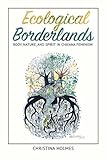Ecological borderlands : body, nature, and spirit in Chicana feminism / Christina Holmes.
Material type: TextSeries: NWSA / UIP First Book Prize SerPublisher: Urbana : University of Illinois Press, [2016]Description: 1 online resourceContent type:
TextSeries: NWSA / UIP First Book Prize SerPublisher: Urbana : University of Illinois Press, [2016]Description: 1 online resourceContent type: - text
- computer
- online resource
- 9780252098987
- 0252098986
- Ecofeminism -- Mexican-American Border Region
- Mexican American women
- Women -- Mexican-American Border Region
- Women and the environment -- Mexican-American Border Region
- Environmental justice -- Mexican-American Border Region
- Feminism
- Mexican Americans -- Study and teaching
- SOCIAL SCIENCE -- Feminism & Feminist Theory
- SOCIAL SCIENCE -- Ethnic Studies -- Hispanic American Studies
- SOCIAL SCIENCE -- Gender Studies
- Ecofeminism
- Environmental justice
- Feminism
- Mexican American women
- Mexican Americans -- Study and teaching
- Women
- Women and the environment
- North America -- Mexican-American Border Region
- 305.48/86872073 23
- HQ1194
- SOC010000 | SOC044000 | SOC032000
- SOC032000.
- National Women's Studies Association/University of Illinois First Book Prize
"This project focuses on environmental practices among Mexican-American women and offers a rethinking of ecofeminism from the standpoint of Chicana feminists. Christina Holmes examines ecological themes across film, literature, murals and other visual art, Chicano nationalist activism, and contemporary direct action organization and presents how Chicana artists, activists, and scholars craft alternative models for ecofeminist praxis. Drawing on debates central to earlier ecofeminist work, Holmes analyzes issues around embodiment, women's connections to nature, and the place of spirituality in ecofeminist philosophy and practice. Chicana environmentalism provides pathways to insights in decolonization by linking social and ecological justice outside of a narrow framework, and Holmes seeks to explore the challenges to debates in the canon of ecofeminist literature to develop a more inclusive model of environmental feminism to alleviate some of the biases in Western feminism. Close readings of theoretical work; careful elaborations of ecological narratives in Chicana cultural productions; histories of land, water, and work rights struggles in the Southwest; and a detailed description of an activist exemplar of Chicana eco-feminist practices all work in tandem to underscore the importance of living with feminist commitment in body, nature, and spirit. Chicana Environmentalisms demonstrates how Chicana feminists have actively and materially stretched themselves into coalitions with human, nature, and spirit others, and these acts underscore the role of agency in Chicana ecofeminist work"-- Provided by publisher.
Includes bibliographical references and index.
Print version record and CIP data provided by publisher.
Title Page; Copyright Page; Dedication Page; Contents; List of Illustrations; Acknowledgments; Introduction. Ecological Borderlands: Connecting Movements, Theories, Selves; 1. Borderlands Environmentalism: Historiography in the Midst of Category Confusion; 2. Misrecognition, Metamorphosis, and Maps in Chicana Feminist Cultural Production; 3. Allegory, Materiality, and Agency in Amalia Mesa-Bains's Altar Environments; 4. Body/Landscape/Spirit Relations in Se�norita Extraviada: Cinematic Deterritorializations and the Limits of Audience Literacy.
5. Building Green Community at the Border: Feminist and Ecological Consciousness at the Women's Intercultural CenterConclusion. Bridging Movements with Technologies for the Ecological Self; Notes; Bibliography; Index; About the Author.
National Women's Studies Association/University of Illinois First Book Prize
eBooks on EBSCOhost EBSCO eBook Subscription Academic Collection - Worldwide

